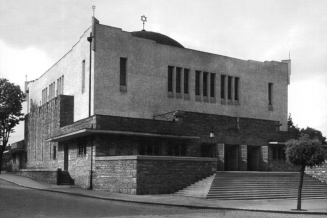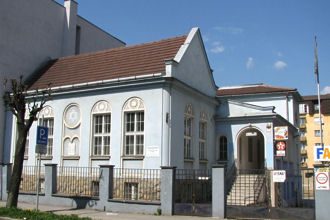Nevertheless, all steps of executive administrators were aimed at expulsion of Jews, ipso facto, getting rid of them for ever. To this aim contributed various lists and records of Jews. Concentration centres were established in March 1942 to converge Jews, officially scheduled for work. Their real purpose, however, was to deport them to extermination camps. Zilina concentration centre, one of five on the territory of Slovakia, started its activity on 21 March 1942. The camp was situated in unsanitary wooden shacks, long time deserted, formerly belonging to garrison houses. The first impression the camp offered, was this: squalor, dirt, desperate faces of starving people. Sadism of their wardens presaged the hell of Oswiecim. Detainees were robbed of valuables, subjected to physical search. Daily routine included chicanery and beating of prisoners. Jailers took bribes. Prisoners, thus redeemed, had to provide others to take their place in transport.
According to probably a German list, there were 19 transports despatched from Zilina in 1942, most of them destined to extermination camp Oswiecim. Transports, that set out from Zilina, carried away 18,223 Jews for journey with no return. District leader reported on 19 June 1942, that up to then 1,321 Jews were transported out of Zilina rural district. Altogether, nearly 58,000 Jews were carried away in 1942 from the territory of Slovakia. Out of them survived 282 people.
Concentration centre in Zilina ceased to exist on 24 October 1942. In wake of temporary cessation of deportations in October 1942, about 24,000 Jews were left in Slovakia, out of them, the number of Zilina Jews is estimated at one thousand. Slovak authorities themselves had not renewed deportations, even though various anti-Jewish crackdowns went on. German army occupied Slovakia on 29 August 1944. Germans sanctioned no exception clauses and, starting with 13 September, transported to extermination camps the remaining Jews. 900 to 1000 persons were thus deported. More Zilina Jews were murdered in Slovakia itself. Zilina was left without Jews. According to the list compiled by Haim Gordon, 2,668 (Jews from Zilina) lost their lives during the holocaust. This count is not quite accurate. Even today new names are entered into the list, names, which have been forgotten, or, on the other hand, names are discovered, that shouldn’t have been on the list in the first place. No number can convey the extent and significance of this all-encompassing tragedy.
Zilina Jews in the Second World War were not only defenceless victims. Many of them joined their forces in the resistance against fascism. For a certain period of time our town was a harbour for Rudolf Vrba (Walter Rosenberg) and Jozef Lanik (Alfred Wetzler), who escaped from Oswiecim, and conveyed important information about the methods the Jews in this camp were murdered. Daniel Dionyz Lenard, Majdanek escapee, who gave testimony about conditions in this concentration camp, came from Zilina. Ervin Steiner from Zilina and others helped to rescue Polish Jews, counterfeit documents had been produced by Janko Weil and others. Martin Spitzer crossed adventurously to Switzerland in a railway carriage. Akiva Nir (Karol Neufeld), Leopold Sram (Schramm), and Arieh Klein had actively participated in the SNP (Slovak National Uprising), Zvi Gross, Pavel Feldmann, Julius Bronner and others died in it. Matilda Braun and Vojtech Braun fought in the Czechoslovak Svoboda Army. Frantisek Hersch, Bernard Ring, Imrich Glasel and others died in Czechoslovak Western Army, while Ladislav, Zolo, and Pavel Bock, Ladislav Scheimann, and others fought in it. Zilina was liberated on 30 April 1945. One Jewish soldier found his death on this momentous day.
Remnants of Jews from Zilina, when returned home, found a different city. Most prewar Jewish physicians and attorneys were removed, likewise many real estate owners, industrialists, entrepreneurs, shop owners, sportsmen. This left its marks on the quality of life in town, on its developmental potential. Zilina has lost forever a major part of its inhabitants, who helped to form its character.
| …previous page |







